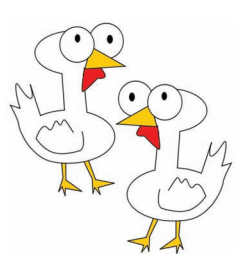 Look, a chicken!
Look, a chicken!
If you don’t understand that comment, you probably can’t relate to the distractions posed by iPods, TVs, and cell phones; the guy down the hall whistling, the fire truck going by outside, and the dog barking at the paper bag blowing in the wind—and you obviously can concentrate far beyond the powers of most of us.
Look, a chicken!
Most of us will look, lose our place, and forget what we’re doing.
Even today’s collegians.
That’s what was reported recently in a 2010 survey by the University of California Libraries, where many students admitted they could be distracted easily when studying. That’s why they prefer print books, not eBooks.
Surprised?
According to a blog by Mike Kelley, distributed through LibraryJournal.com, the information came after a Springer eBook pilot project was initiated within the University of California Libraries. A total of 2,569 responses were received.
Kelley is a former New York Times staffer and now is news editor for LibraryJournal.com.
They showed 58% used eBooks, with postdoctoral researchers using eBooks the most, at 68%. Undergraduates—58%—said they preferred print books, many because it’s easier to concentrate with a print book than with an eBook.
“Paper formats are preferable because it is easier to memorize things [that] are in my hand and that I am physically underlining, highlighting, etc,” responded one undergraduate in social sciences. “However, making legible, organized notes is easier with an electronic version of the book or chapter, e.g., using FoxIt Reader to make side notes on a PDF.”
A second respondent, a faculty member in the arts and humanities, agreed. “It is easy to annotate with notes. I can organize my library by theme and quickly pick out the relevant text.”
Many of those responding acknowledged that search functions make eBooks and journals preferable for research.
“Being able to search the book for keywords is fantastic,” said a student studying for an arts and humanities master’s degree. “It has changed how I read. Especially when looking for secondary sources that lie further outside my field but might be appropriate.”
Another student said eBooks reduced the amount of time needed to search. A third added “eBooks are really helpful for getting down excerpts and finding specific information without leafing through the entire book.”
As the scholarly publishing field continues to struggle with conversions from print to electronic versions of its work, the Springer survey is an interesting one.
Some journals have chosen to “go cold turkey,” leaving print behind when the journals become available online. This survey might make those still in print or about to make the switch think twice.
Look, a chicken!
If you still aren’t convinced, read on.
What do you do, those taking the survey were asked, when you find an eBook you are interested in?
They borrow or buy the print version, the respondents indicated, including 75% of those studying arts and humanities, 60% in physical sciences and engineering, and 40% in health sciences.
“eBooks save me a trip to the library in these cases. But I rarely read books online. The interface is clunky, my Internet is slow, and I am a better reader when I have the print copy in front of me,” said a student in the arts and humanities. “For me, eBooks are another research tool but not a replacement for the print copy.”
A life sciences student agreed. “I either go purchase it or borrow it from the library,” the respondent said.
So eBooks and journals aren’t necessarily a replacement for print copies for some readers. At least not yet.
That’s something for CSE members to keep in mind as we progress further into this 21st century.
Don’t get too smug surrounded by your print galleys, however.
Barnes & Noble CEO William Lynch recently told conference-call participants eBooks sold by his company outsell print books 3 to 1.
Readers love the Nook, Barnes & Noble’s eReader, and sales have increased by $858 million, or 65%, compared with last year, Lynch reported.
Confused yet? You should be. While you blinked, another chicken or maybe a whole flock just crossed the road!
TERESA M MELCHER is editor of CSE’s Science Editor. She can be reached at editor@selfpublishingpress.com.
